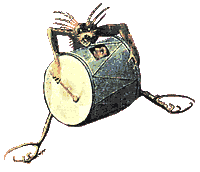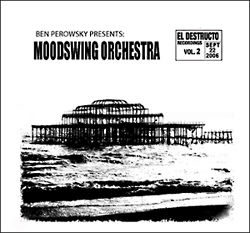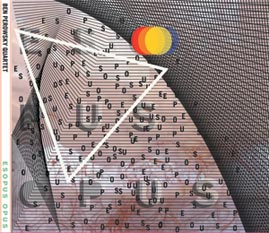Press
 MOODSWING ORCHESTRA review from Buenas Aires!!
MOODSWING ORCHESTRA review from Buenas Aires!!
The new alternative to press:
TONIC GIRLS click on tonic girls for a great PR experience.
New "Camp Songs" review from France: pepper-zone
Follow this link:
“MODERN DRUMMER FEATURE MARCH ’03 ISSUE”
for Ken Micallif’s interview with Ben
CAMP SONGS voted in JAZZTIMES TOP 50 CDS OF 2003! (Wayne Shorter on cover) Finishing in line with Jaco Pastorius Big Band, Elvis Costello, and Kurt Roesenwinkel
Also reviewed in Jazztimes Nov. 2003 “Drum Beat” (Max Roach on cover) along with other drummer leaders: Max Roach,
Aldo Romano, Elvin Jones, Joe Chambers, Gerry Hemingway, Winard Harper, T.S. Monk and Steve Smith – by Nate Chinen … 
“…Surprising in a different sense, Camp Songs (Tzadik) finds drummer Ben Perowsky riffing on the traditional prayer melodies of his summer camp youth. He couldn’t have chosen better partners in the task; pianist Uri Caine and Drew Gress have worked together in a host of settings and a wide range of material, and their rapport with Perowsky is airtight. (As it should be, given that the three musicians work together under Caine’s leadership.) Thanks largely to Caine’s harmonic recasting and melodic abstraction, the group tease out the jazz elements of its ethnic-folk repertoire. And the gambit rarely feels like a gimmick, even when vocalists Oren Bloedow and Jennifer Charles (of goth pop group Elysian Fields) join the fray for a haunting "Birkat
Hamazon." Although released under John Zorn’s "Radical Jewish Culture" banner, Camp Songs is less radical
than reasonable: It underscores an affinity that always lurked beneath the surface. The album suceeds as a listening experience because
of what Perowsky and friends manage to do with the stuff.”
REVIEW FROM ALL MUSIC GUIDE:
“Here, New York City-based modern jazz drummer Ben Perowsky reworks prayer songs that he learned as a child while attending summer camp in upstate New York. Ultimately, the trio featuring pianist Uri Caine and bassist Drew Gress rearranges these sacred songs — sans two originals by Perowsky — into a series of loosely performed jazz works, as the band’s hip outlook surfaces quite nicely via driving swing vamps intermingled with freely organized exchanges, boogie-blues, and more. No doubt, Perowsky possesses laudable chops amid his lyrically charged sense of swing and power rolls. However, this set comes across as a cohesive group effort, founded upon the drummer’s take on Jewish prayer tunes. Many of these pieces are constructed upon airy soundscapes and fragmented themes, enhanced by Perowsky’s multi-hued cymbal swashes and Caine’s extraordinary improvisational abilities. With the piece titled "Birkat Hamazon," the drummer enlists a vocal duo for a delicately orchestrated jazz groove marked by Brazilian samba and Jewish traditionalism. A delightful listening experience indeed.” — Glenn Astarita
BOP ON POP
click here for: ALLABOUTJAZZ REVIEW JUNE 2003
Reviewed by Owen Cordle for JAZZTIMES magazine April, 2003.
“Ben Perowsky, his father, Frank, and Sam Yahel are a trio that leaves you feeling optimistic about the state of jazz. No, they don’t play prophetic or futuristic music. Nor do they sermonize about the past. They do, however, on this album, perform crisp, straightahead jazz with originality, swing and passion.
Drummer Ben, who produced the session, has worked with Roy Ayers, Walter Becker (of Steely Dan), Dave Douglas, David Liebman, the Lounge Lizards, Pat Martino, James Moody and John Scofield, among others. He creates excitement in a classic Buddy Rich and Louie Bellson sort of way, although stylistically he owes as much to more modern drummers. (He studied with Bobby Thomas and Alan Dawson.)
Tenor saxophonist and clarinetist Frank, a big band alum (the Elgarts, Woody Herman, Bill Watrous, Thad Jones/Mel Lewis) and Broadway pit-band musician, has a fine tone and a flair for bop lines that breathe. He is one of but a few bebop clarinetists. On Fats Waller’s "The Jitterbug Waltz," Horace Silver’s "Quicksilver" and Charlie Parker’s "Donna Lee" his clarinet style suggests Tony Scott. On tenor on the other six tracks, he is occasionally reminiscent of Hank Mobley and early Sonny Rollins, which is to say thoughtful, structured and clear in direction.
Organist Yahel (who has been performing in Joshua Redman’s Elastic Band) appears on seven tracks and provides all the right harmonic colors for the ensemble. His accents and dynamics often add a subtle hint of mystery to the proceedings. Although Yahel is plenty funky and punchy on "Star Eyes," he generally eschews the grits-and-gravy jazz organ style throughout the album in favor of a more diverse menu.”
May 11th, 2000
Ben talking with Michael Azzerad (writer from Rolling Stone magazine, "come as you are" nirvana biography, and drummer for "king of france")
Behind the drum kit, Ben Perowsky resembles a chef happily tossing a salad. He plays with a miraculous minimum of motion, drawing immense dynamics, rhythmic complexity and a bewilderingly wide range of tones from the drums with the graceful economy of a black-belt. And the cat can play anything. Unsurprisingly, he’s one of the hottest drummers in New York.
Perowsky debuted on a 1988 live album with jazz-funk vibraphonist Roy Ayers at London’s legendary Ronnie Scott’s; only 22, Perowsky had rehearsed exactly once with the band — and still tore it up. Since then, he’s played with a diverse bunch of A-list musicians like Rickie Lee Jones, Walter Becker, John Cale, the Lounge Lizards, John Zorn, jazz guitar greats Pat Martino and Mike Stern, and Malian pop star Salif Keita.
Perowsky was born into jazz — his father is saxophonist-arranger Frank Perowsky, with whom Ben was playing straight-up bebop by his early teens. But between the Led Zeppelin his brother cranked, his mom’s Sly Stone records and the smorgasbord of sounds on the streets of his native New York City, young Ben soaked up a vast array of influences.
While he still plays bebop with Dad (album coming this fall) Perowsky has delved into a wide range of modern music, like Lost Tribe’s jazz fusion, the prog-pop Fertile Crescent, the wonderfully uncategorizable Spanish Fly, ambient trip-hop unit Liminal and incandescent moodists Elysian Fields. And check out his uncanny drum ‘n’ bass drumming in the electronica documentary Modulations. It’s like he knows several languages.
Many of those languages go into the recently released debut by Perowsky’s eponymous trio with bassist Scott Colley and saxophonist/clarinetist Chris Speed. Perowsky’s compositions virtually define the new downtown jazz, and the fiery, telepathic band simply shoots them through the roof. The trio flaunts its varied roots with a groovy take on Pink Floyd’s “Money,” an exhilarating sprint through a Messiaen piece and an eloquent “In A Sentimental Mood.” Visit www.perowsky.com for some sounds.
On a sleepy May afternoon, Perowsky sat down for a chat in a Lower East Side cafe, just before launching a month-long European tour with legendary jazz guitarist John Scofield.
YOUR DRUMMING HAS A MELODIC APPROACH. WHERE DOES THAT COME FROM?
I’ve always been attracted to melody. When I was studying jazz a lot, I would sing along with the solos. And then later on I realized that I hadn’t memorized what Philly Joe had played — I could sing Trane’s solo but I had no idea what Philly was playing.
BUT HOW DO YOU PLAY DRUMS MELODICALLY? IT’S NOT A MELODIC INSTRUMENT… RIGHT?
Oh, I beg to differ. I can definitely hear melodies when I’m playing. It’s about phrasing, like the way a horn player phrases something. Certain drummers are more ‘drumistically’ oriented — you can tell they grew up in marching bands and they played this… drum language, and that’s great — I try to get that, too. Then there’s drummers like Paul Motian where you don’t hear that at all. Not to say that he doesn’t have chops, but he plays musical phrases rather than paradiddles and ratamacues.
THERE’S A LOT OF SUGGESTION INVOLVED, TOO.
Right, exactly — ‘suggestion’ is a good word. I can play a three-note phrase on the toms and ask five people to sing it back to me and I’ll get five different takes on how it sounded. There are so many overtones on each drum and cymbal, depending on the way you hit them.
YOU PLAY WITHOUT FLAILING YOUR ARMS.
If you’ve ever seen videos of old-school drummers, they don’t move at all. I feel like if I’m moving too much, it’s going to tire me out for no reason and maybe even get in the way of the sound I’m trying to get out of the kit. I recently saw Jack DeJohnette and he was playing more stuff than most people can ever imagine and he never moved his upper torso — unless he was twisting to play one of the two or three floor toms he had [laughs]. Philly Joe was just straight up. Even Elvin Jones, he doesn’t flail his arms that much, Art Blakey… Those are the guys that I watched.
DID YOU SEE THOSE GUYS IN PERSON?
Yeah. My dad took me when I was very young and then I went by myself. I saw Philly Joe play a lot and Art Blakey even more than that. I really watched those drummers in person a lot. I also watched a lot of Keith Moon on film. I wish I had seen him live — he was incredible. I guess I’m kind of old school.
WHAT’S THE CHALLENGE OF LEADING A BAND FROM THE DRUMS?
If I were a trumpet player, it would be easier to cue things, being at the front of the stage instead of the back. Even Art Blakey had a musical director who would cue things. So that’s a challenge for me, to establish that role and get people to look up and take cues from the back.
YOUR FATHER’S INFLUENCE IS OBVIOUS. BUT HOW ABOUT YOUR MOTHER, WHO WAS A BALLET DANCER?
Well, she was the one with all the Sly Stone records. She had a really cool record collection.
I THOUGHT MAYBE THE DANCE THING…
Not really. I appreciate dance. I go see dance and sometimes I’ll do music for dance. But musically, it was her records.
DRUMMING _IS_ LIKE DANCING…
I definitely suggest to any drummer to go out dancing. You have to be in touch with your limbs in order to make them come down at the right time. Or just stomp your feet and clap your hands.
WHAT’S THE BEST ADVICE ANYBODY’S EVER GIVEN YOU ABOUT DRUMMING?
When we were making the Fertile Crescent record, [producer] Roger Moutenot said something that always stuck with me. I was a lot younger and I had Roger up on this pedestal — ‘Wow, this guy engineered Bill Frisell records!’ So I asked him for some advice as a drummer and he just said to get everything centered so things come down together. Especially in a pop context, that is so important. I can’t remember exactly how he said it, but it always stuck with me as something to go for. It’s got to feel good. It can’t be skipping all over the place.
DO YOU HAVE A MAIN KIT?
I usually use… I should preface any gear talk with ‘I’m really looking for an endorsement right now…’ [Laughs] I’m still playing on the same stuff I was playing on in high school. I have a Gretsch kit in jazz sizes: 18” bass drum, 8×12 and 14×14 toms. I use those toms regardless of what size kick I’m going to use. I also have a 20” Gretsch kick and a 22” Pearl kick. It depends on what kind of music I’m doing at the time — it goes from completely acoustic jazz, which I’ll use the 18” kick for, to more electric stuff, where I’ll go to the 20”. And once in a while I’ll bring out the 22” when I really need to have a heavier sound. But the 20” is punchy enough for all kinds of stuff.
WHAT KIND OF HEADS?
Coated Ambassador. I endorse Remo heads and I use them. I use coated Ambassadors on top and clear Ambassadors on the bottom. But I’ve been experimenting — for a jazz sound I like to put coated Ambassadors on the bottom, too. When I’m playing bebop, I like to tune the drums up pretty high, and somehow with a thicker head on the bottom you get a little less ring. When I’m tuning it up way high, I like ring but when I hit the drum I don’t want it to be like I’m pushing on a sustain pedal. Sometimes the Gretsch can sing so much that it’s a little too much, maybe.
WHAT ABOUT THE SNARE DRUM?
I have a Brady, standard depth. I guess it’s jarwood [ck?] — it’s carved out of one piece of wood. I got it ten years ago and I’ve been using it ever since. But Ludwig is the most consistently good sounding snare. I have an old Ludwig Acrolite snare drum, the student model, and that’s good for certain things. It doesn’t speak as well as the other Ludwig I have, a chrome Supraphonic. I’d use that on a jazz gig where I need to have a lot of sensitivity, where I have to play lightly on it but have it speak.
HOW ABOUT CYMBALS?
I play Zildjian cymbals. I just went to the factory and got a bunch of stuff — a 22” Constantinople light ride… I’ve played so many cymbals through the years, I’m constantly changing them around to get the right combination. I also picked up an 18” Constantinople — this suspended crash cymbal made for classical professionals — and it really worked. It’s got a really nice bell on it, too. With high hats I go back and forth a lot. I’ve been using 14” A Custom Zildjian hats. Ultimately, I’d like to have an old set of K hats — there’s nothing like that stuff for playing jazz. They have the warmth, that sound, somehow you manage to get attack with not too much wash. They’re getting close to that with the Constantinoples.
The “new” NYC Young Lion: An Interview with Jazz drummer Ben Perowsky
By Brian L. Knight – follow this link “The Vermont Review”
Bill
Milkowski (JazzTimes11/99 )
“Drummer Ben Perowsky brings so much depth and versatility to the kit that he’s been a sideman of choice for an astonishing variety of players. In the past few years, Perowsky has played on Dave Douglas’ Magic Triangle, Pat Martino’s All Sides Now, Mike Stern’s Play , and Salif Keita’s Papa while also performing with Uri Caine’s Mahler project, Don Byron’s Bug Music, and the fusion quartet Lost Tribe. There’s also the indie rock band Elysian Fields, and dub/electronica group Liminal, and a straight ahead jazz quartet led by his sax-playing father, Frank. But by far the most expressive outlet for his very melodic, Tony Williams-inspired approach to the kit remains the Ben Perowsky Trio. Formed in 1997 for a weekly engagement at the Knitting Factory’s Tap Room, the BP Trio has developed into a vehicle for the drummer’s open-ended writing. And with empathetic bassist Scott Colley and saxophonist Chris Speed on board, the music takes on a highly conversational flow, as heard on the group’s self-titled debut on Jazz Key Music. A role model for the trio, Ben explains, was Sonny Rollins’ A Night at the Vanguard recordings with Wilber Ware and Elvin Jones. “All three of us grew up listening to those records,” says Perowsky, “But actually, my own roots go back to Led Zeppelin, Jimi Hendrix, and Pink Floyd.” Which explains the presence of Floyd’s “Money” as the closing track, done up in a loose grooving, freeblowing fashion. Elsewhere, Perowsky demonstrates a lyrical touch with brushes on his “Electric Sheep” and a decidedly Elvin-esque way with mallets on Ellington’s In a Sentimental Mood. He swings frenetically on Bird’s Segment and offers up a take on Messiaen. Granted, thats covering alot of ground, but it’s still not revealing the full picture. “I did’nt want to bring all my bags into one project,” says Perowsky. “There is’nt really one band that I could play all the different styles in. And more and more, the different bands don’t bleed into each other stylistically as much as they used to. So now I’m just going for whatever the music is dictating.”
Ben Perowsky Trio, (JazzKey Music, Ltd.), released ’99
"This live recording at the Knitting Factory in NYC surely recalls the old Village Vanguard trio sessions of Sonny Rollins, Wilbur Ware &Elvin Jones gone further out. They are similar in spontaniety and progressive attitude. Extendo-saxophonist/clarinetist Chris Speed and in-the-pocket bassist Scott Colley join rubber band flexible and potent drummer Perowsky as a power trio that is juggernaut, steamroller powerful in most instances, though there are some tender moments present.
One such demure respite is a version of "In A Sentimantal Mood" done in more lavendar that blue shadings, Speed on tenor. The opener, "El Destructo,"a 13 minute modal workout in 10 beats to the measure, carves out the essence of the combo, more a deconstructo. "Janitor" is also aggressive, hip and happening, as is a fine take on Charlie Parker’s bop flagwaver "Segment. As a zinger, they tackle an Olivier Messiaen theme arranged by Perowsky
"Danse De La Fureur, Pour Les Sept Trompettes," Speed on clarinet during a 2 1/2 minute hyper-kinetic romp. "Electric Sheep" is free and spooky, as is Pink Floyd’s "Money," featuring Speed’s melodic, smeared and multi-phonic lines. It’s a trip, it’s a gas.
There are many redeeming moments, as the collective musicianship is strongly framed. Perowsky, as leader, is willing to both take chances and adopt familiar themes, mixing them in an alchemists brew that crosses many cultural and generational lines."
Michael G.
Nastos, All About Jazz Webzine 7/99
"The drummer’s self-titled trio album (jazzkey) is a success with Chris Speed’s saxophone and clarinet well focused by the compositions and Scott Colley’s bass holding the ground, all of which bodes well for these live trio sets."
Gary Giddens (Village Voice 7/13/99)
"Color can be a rhythmic impetus just as much as "regular" cadences can, and this versatile drummer finds ways to incorporate the two. The result is a rainbow full of vim. His B.P. Trio – with Scott Colley and Chris Speed, agile improvisers who realize that pressure can be pretty – has a nifty new disc that underwrites cooperation at every turn."
Jim Macnie
(Village Voice 9/7/99)
"The drummers self-titled trio album (jazzkey) is one I find myself returning to, an openhearted an convincing jaunt in which the compositions bring out the best in the gited saxophonist and clarinetist Chris Speed, which Scott Colley’s bass holds."
Gary Giddens
(Village Voice 9/21/99)
Ben Perowsky Trio, (JazzKey
Music, Ltd.)
"Three of the most talanted sidemen in the business appear on drummer Ben Perowsky’s debut as a leader. Recorded live at the Knitting Factory during this group’s weekly series of gigs in 1997 and 1998 (complete with the clinking of glasses and the dull roar of background noise) this release documents the group tackling original material mixed with covers of Bird, Ellington, even Roger Waters.
The result is an exciting, sometimes tongue-in-cheek, approach combining inflections of drum-n-bass and groove with wide-open tunes providing plenty of room for improvisation. The interplay between Perowsky and bassist Scott Colley clearly exibits their decade long collaberotion, as tenor sax and clarinet player Chris Speed takes the melody spotlight and extended space and soloing opportunities in stride, completing the circle begun by the partners in rhythm.
The three Perowsky-penned originals are all excellent. Both the opener "El Destructo" and "Janitor" employ entrancing and often groovy bass riffs from Colley. The latter has Perowsky opening the piece with a Mitch Mitchellesque drum intro that sets the tone from the get-go, making this tune the highlight of the set. "Electric Sheep" turns the knob to slow boil while the group composed "Pixy 99" sounds like something from the MMW repertoire, with Speed imitating arco bass by blowing air through his tenor. As for the covers, the small group dynamic favors Bird’s "Segment" and Perowsky’s arrangement somehow makes Messiaen’s "Danse Du La Fureur Pour Les Sept Trompettes" seem like a natural choice. Ten minutes of "In a Sentimental Mood" seems a little much, as does eight minutes of Pink Floyd’s "Money, though both certainly have their moments.
Overall, this album does two important things very well. It is an authentically documented time and place with a great
group and it leaves us wanting more — particularly more Perowsky compositions. We can only hope the success of this disc will give the powers-that-be the impetus to allow this long-time sideman the opportunity to flex more of his muscles as a leader."
Scott Menhinick for Signal to Noise
"There is a network of young players now who have created an alternative jazz scene- Ben Allison, Ben Perowsky, Matt Wilson, Seamus Blake, Adam Rogers, Steve Bernstein, Dave Binney, all of whom are playing adventurous original music."
John Scofield from JazzTimes interview 8/98



